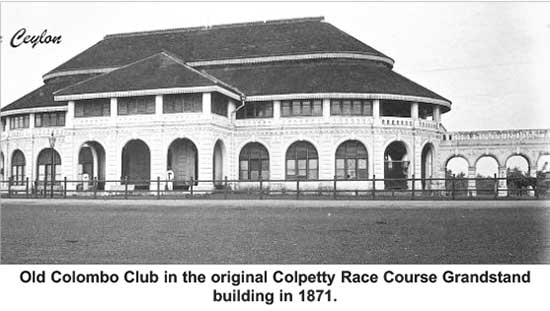
Source:Island
Confessions of a Global Gypsy
By Dr. Chandana (Chandi) Jayawardena DPhil
President – Chandi J. Associates Inc. Consulting, Canada
Founder & Administrator – Global Hospitality Forum
chandij@sympatico.ca
On entering the Ceylon Hotel School (CHS), I motivated myself to treat the world as my oyster. My plan was to dream big, work hard, and dive deep to find my pearl. Well, it was certainly not a bed of roses or plain sailing, as many obstacles awaited my first day of a long career journey towards becoming a hotelier.
Marching orders!
On October 11th, 1971, I did not need any help from my alarm clock, to wake up early to go to CHS for our day one orientation. All freshers were rudely awoken around 5:00 am by a handful of loud-mouthed second year students, who were the designated rag leaders. We were lined up on the basketball court and were forced to do 50 push ups. When one senior heard that I was a Judo fighter, my rag harassment was doubled to keep me under control. That meant 100 push ups for me, every morning, during the rag period.
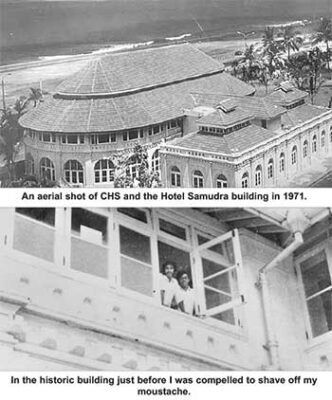 We then had a cold shower in a large bathroom with 20 shower heads, but no partitions. This was worse than what I had experienced during my annual visits to Diyatalawa army camp as a cadet. After dressing up and having breakfast, all 28 newcomers in my first-year batch were ordered by seniors to line up in pairs. As commanded by the rag leaders, we marched for a few minutes from the CHS hostel located at 78 Galle Road, Colombo 3 to Samudra Hotel, opposite the Galle Face Green (current location of Taj Samudra Hotel), where CHS was located. A ritual of the CHS’s week-long rag was that the freshers had to stop marching briefly to salute every female we passed during our morning routine along the Galle Road.
We then had a cold shower in a large bathroom with 20 shower heads, but no partitions. This was worse than what I had experienced during my annual visits to Diyatalawa army camp as a cadet. After dressing up and having breakfast, all 28 newcomers in my first-year batch were ordered by seniors to line up in pairs. As commanded by the rag leaders, we marched for a few minutes from the CHS hostel located at 78 Galle Road, Colombo 3 to Samudra Hotel, opposite the Galle Face Green (current location of Taj Samudra Hotel), where CHS was located. A ritual of the CHS’s week-long rag was that the freshers had to stop marching briefly to salute every female we passed during our morning routine along the Galle Road.
Historic building
We nervously entered a historic, 100-year-old colonial building which housed CHS and a 10-bedroom Samudra Hotel, both which were managed by the Ceylon Tourist Board. This was the original location of the famous Colombo Club one of the oldest, and most old fashioned ‘exclusive’ gentlemen’s clubs in Ceylon built in 1871. This building was also the former Colpity Race Course Grandstand. I had no clue of the significance of this building where I would spend most of my next three years. I was surprised to learn these details, when my father gave me a brief history lesson, a few days later.
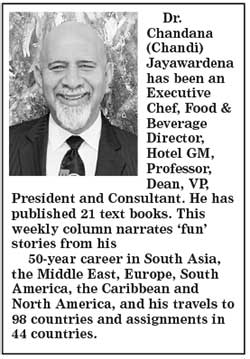
German welcome
“Guten Morgen!” We were welcomed to CHS by its German Principal, Herr Reinhold Sterner flanked by t
wo German lecturers and a Swiss-German Maître d’hôtel. From his stern look, I knew
at once that the Principal disliked my long curly hair, moustache, side burns, thick belt, and the ‘groovy’ bell bottoms. Later that day, I was compelled to shave off my moustache and shorten my hair. We were more comfortable with the Sri Lankan faculty led by Mr. Eardley Edrisinha, Vice Principal, who impressed us during the orientation by remembering the full names of all 27 of my batchmates. Mine was the only name he did not remember. Perhaps that was owing to my poor performance at the interview and my unsuitability to join CHS.
Later, we met four 1969 graduates from the very first batch of CHS who had undergone two years of postgraduate industrial and teacher training in West Germany on Carl Duisberg Society scholarships. They returned to join CHS as Lecturers to understudy the experienced European lecturers. They were in their mid or late 20s, fluent in German, dressed well, and were generally more friendly with the students. We were inspired by them, and we wanted to be like them in five years’ time (and some of us did manage to do so). There were several excellent part-time teaching staff, but we were far more interested in a young and beautiful German lady with long blond hair, and often clad in fashionable miniskirts, who taught German at CHS.
Culture shock
Teaching students in hotel schools in western countries is generally easier as they are more familiar with aspects such as western food, wines, cheeses, formal dressing, and using different types of cutlery and glassware. In our case, we had to learn everything from scratch. Up to that point, most of us had eaten all our meals at home with fingers, never tasted a wine, and some of us had never worn a tie! All communication at CHS was done in English, although we communicated mainly in Sinhala when at the hostel. One thing we were not free to do at home or high school before joining CHS was smoking. Therefore, we were shocked when a couple of young lecturers offered us cigarettes when we dined at their tables. We felt like adults at that point. Almost all male adults smoked at that time, and it was cool.
We were fortunate t
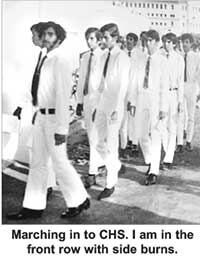
hat in the style of Germanic education, CHS was a hands-on school. We had lots of practical training or lab sessions. We basically had practical labs everyday – International cooking, Sri Lankan cooking, and restaurant service twice a week. The fifth day we had to practice dining etiquette as customers in the training restaurant, and on alternative weeks we had to wash d
irty dishes, (which I hated). I also disliked spending the whole morning of every Saturday cleaning CHS – kitchen, restaurant, classrooms, toilets etc.
Mastering dishwashing
I was told that cleaning and washing dishes at CHS was a good starting point for anyone who eventually wants to become a Hotel Manager. I did not believe it then, and got into trouble at CHS when I identified that activity as free labour. Fifty years later, I would recommend it to any aspiring hotelier, as once one climbs the steps of the career ladder, one never gets a second chance to gain such experiences. In my mid-career, as a Director of Food & Beverage or General Manager of hotels, I had overall responsibility for Kitchen Stewarding Departments with around 35 employees. That brief dish washing experience at CHS and Hotel Samudra helped me to understand the role of kitchen stewards and the importance of their hard work, which in turn helped me to become a better, more understanding hospitality manager.
Learning the ropes
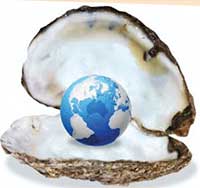 Soon after settling at the CHS, we got a few opportunities to get some work experience outside the CHS and earn a little pocket money. As this type of ad hoc work assignments during our year-one was not mandatory, some studious students in my batch ignored such opportunities. At 17+ years of age I was the youngest, and most immature, in my batch. Throughout my three years at CHS, I hardly did any studies. However, very early on I understood that I am joining an industry where action learning at workplace was the best education for a future Hotel Manager, than reading books to master service, cooking and hotelkeeping. It also provided much needed pocket money for cigarettes, alcohol, chocolates, movies, and small gifts for girlfriends. With that attitude, I jumped at any such opportunities that came our way. In fact, when I graduated after spending three years at CHS, I was easily the most experienced in my batch. By the time I graduated I had gained part-time work experience in ten diverse organizations.
Soon after settling at the CHS, we got a few opportunities to get some work experience outside the CHS and earn a little pocket money. As this type of ad hoc work assignments during our year-one was not mandatory, some studious students in my batch ignored such opportunities. At 17+ years of age I was the youngest, and most immature, in my batch. Throughout my three years at CHS, I hardly did any studies. However, very early on I understood that I am joining an industry where action learning at workplace was the best education for a future Hotel Manager, than reading books to master service, cooking and hotelkeeping. It also provided much needed pocket money for cigarettes, alcohol, chocolates, movies, and small gifts for girlfriends. With that attitude, I jumped at any such opportunities that came our way. In fact, when I graduated after spending three years at CHS, I was easily the most experienced in my batch. By the time I graduated I had gained part-time work experience in ten diverse organizations.






